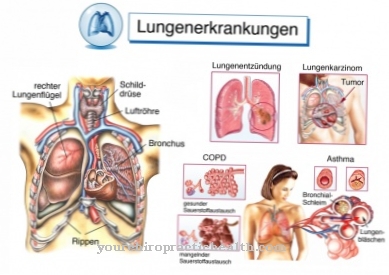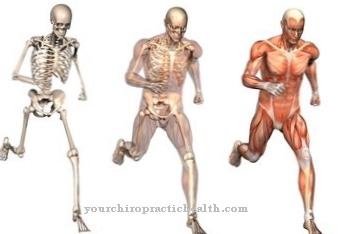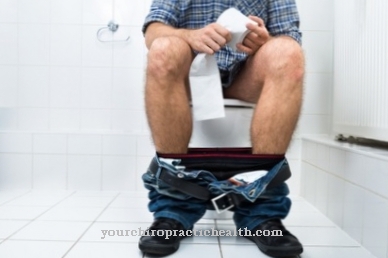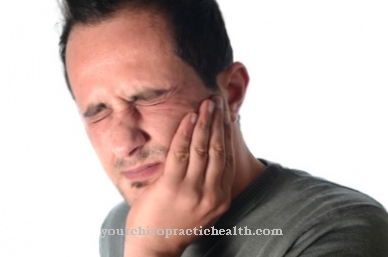A cyst is a fluid-filled cavity in the tissue that is closed off from the rest of the tissue by a membrane (epithelium). One speaks of an encapsulation. In addition, the cysts can be divided into several chambers. The fluids in the cyst can consist of pus, tissue fluid and blood.
What is a cyst?

The term cyst is derived from the Greek word "kystis", which translated means bladder or urinary bladder. A cyst is therefore a fluid-filled cavity that can form in any human tissue. Most often they occur in the breast, on the ovaries of women, but also in the kidneys, liver or even in the lungs.
This cavity consists of one or more chambers and is closed by a capsule. Doctors differentiate between real cysts, which are lined with a layer of cells, and pseudocysts, which in turn are only surrounded by connective tissue. Cysts can vary in size: they can be a few millimeters in size and only visible under a microscope, but they can also take on a size in which they displace tissue or even other organs.
Causes of Cysts
A cyst can have different causes, depending on where it has formed:
If it forms in the skin layer, it is usually due to the fact that fluid cannot run off freely. In the case of cysts in the female breast, the ovaries or in the testicles, however, the influence of hormones is decisive.
Cysts in the kidney and liver are often due to a genetic disease and are therefore inherited. For example, a cyst kidney develops due to a mutation of the 16th chromosome.
Chronic diseases can also lead to the formation of cysts. People with cystic fibrosis (a congenital metabolic disease) are at increased risk of lung cysts, among other things.
On the other hand, the cause of a cyst is rarely found in parasites. An example of this is the dog tapeworm, which is often found in the Mediterranean countries, Africa and South America. The liver cysts it forms usually appear individually and can be up to 30 centimeters in size. But the fox tapeworm also forms cysts that can spread throughout the liver like a tumor. You can find it here especially in the Swiss Jura, southern Germany, the Swabian Alp and in Tyrol.
You can find your medication here
➔ Medicines against edema and water retentionDiseases with this symptom
- Cystic fibrosis
- Pancreatic cyst
- Kidney cyst
- Hydrocele
- Hormonal imbalances
- Jaw cysts
- Bone cyst
- Baker's cyst
- Cystic echinococcosis
- Cyst liver
- Breast cysts
- Ovarian cyst
Complications
Of course, even with a cyst, a wide variety of complications can arise due to various underlying diseases. As a rule, cysts are completely harmless. Many cysts are not noticeable because they are deep under the skin. In such a case, however, complications can arise if the cysts become larger and thus displace organs or impair their function.
This can create a very uncomfortable pressure that should definitely be treated by a doctor. Anyone who has discovered a cyst should also consult a doctor immediately. This is the only way to ensure that it really is a cyst. Often, cysts also appear in the female ovaries, which can even affect fertility.
Embryonic development disorders can also cause cysts that can be removed as needed. Such an intervention usually carries very few risks. One thing is certain: complications associated with a cyst are limited. Usually, cysts are completely harmless unless they enlarge or get in the way of important organs.
When should you go to the doctor?
As diverse as the location of the cyst can be, so are the symptoms that occur in terms of type and intensity. In general, if you have palpable cysts, you should first see your doctor. The same applies to severe or chronically recurring pain and fluids such as pus or blood. Neurological disorders that set in spontaneously - speech or hearing impairments, uncontrollable twitching - should also be reported to a doctor as soon as possible. First of all, a visit to the family doctor is sufficient.
This person will either initiate examinations himself - be it the ultrasound examination as well as blood, urine or stool tests - or refer them directly to a specialist. The choice of specialist depends on the symptoms and the location of the cyst. Women can have palpable lumps in the breast or groin area examined directly by their gynecologist. Men can also develop cysts in the testicles or groin area. You contact a urologist directly.
In the case of disorders of neurological processes, the family doctor usually refers directly to a neurologist. If a hardening in the jaw area is felt, a prompt examination by a dentist is advisable. If left untreated, gums and tooth roots can become inflamed. Often cysts form in the area of the knee or elbow joint as a result of physical overexertion. You can initially treat yourself by immobilizing and cooling, as well as taking weak painkillers. However, if the symptoms worsen, it is advisable to visit your family doctor or orthopedic surgeon.
Doctors & therapists in your area
Treatment & Therapy
Treatment of the cyst depends on its size, the likelihood of malignant degeneration and the severity of the symptoms.
Anyone who has been diagnosed with a cyst should first have it regularly monitored using ultrasound, as there is a chance of spontaneous regression. But even if there is no regression, the symptoms often arise, so that the person affected can continue to live normally even with the cyst.
Depending on the tissue in which a cyst has formed, there are other treatment options in addition to surgical removal. For example, a kidney cyst or a breast cyst can be treated with a puncture.A needle is inserted into the cyst and the fluid is sucked out of the cavity. However, cysts that have formed in the ovary can be treated with hormone treatment. If the treatment does not work, the cyst is then often removed with a laparoscopy.
Outlook & forecast
Most cysts are harmless and will resolve on their own without ever causing discomfort. We are talking about real cysts, which differ from the so-called pseudocysts - these are also harmless, but have a different anatomical structure than a real cyst.
Problems can arise from the size of a cyst or from its location. Large cysts and those that sit in awkward places and press on other organs can cause pain or abnormalities such as changes in the menstrual cycle in the case of ovarian cysts. Depending on the severity of these symptoms, the doctor will decide on treatment or leave the cyst untouched until it heals on its own.
In rare cases, cysts can develop into cancer; the talk is then of a degeneration. Strictly speaking, a cyst is already a tumor-like change, but it is initially benign in nature. This means that it does not scatter and it has clear edges - it can therefore be easily removed surgically and in this form does not lead to organ damage or to life-threatening risks for the patient. The risk increases with the frequency of cysts, because this simply opens up more possibilities for cells to degenerate and the subsequent development of malignant cancer.
You can find your medication here
➔ Medicines against edema and water retentionprevention
Since a cyst usually forms due to heredity or hormonal changes, prophylaxis is not possible. Those who are already pre-stressed can prevent cysts from forming again by taking prepared hormones.
Since such hormone preparations also have side effects, they should be preceded by a detailed discussion with the attending physician regarding the benefits and risks of such prophylactic treatment.
Cysts caused by parasites such as tapeworms can be prevented indirectly. This includes that you do not eat any wild fruits in the forest unwashed, as the fox tapeworm can be absorbed into the human organism with the fox's feces via the fruits (e.g. blueberries).
You can do that yourself
Home remedies are often the most effective remedy for cysts. Moist heat, for example in the form of a compress or a wrap that is simply placed on the cyst, has proven its worth. If the cysts hurt, we recommend using tea tree oil or aloe vera. The latter kills the bacteria and thus contributes to rapid wound healing.
A balanced diet with enough whole grain products and vegetables is also recommended. Red clover or burdock supplements can also be taken to strengthen the immune system and accelerate the healing of the cysts. Cleanliness is also particularly important. The affected area should be cleaned daily with an antibacterial soap and treated with a care product from the pharmacy. In order to prevent further skin irritation, perfumes and similar cosmetic products should also be avoided.
Avoiding stress can reduce the formation of cysts. Those affected should also make sure they get enough exercise and enough bed rest. In some cases, sebum cysts can be punctured independently with a sterile needle. First of all, however, the growth should always be examined by the family doctor or a [[dermatologist] n and treated if necessary in order to avoid complications.





.jpg)





















